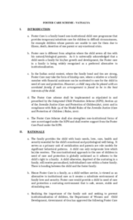The state cabinet of Goa in India has approved a foster care scheme to assist children deprived of parental care or of the care of guardians, and in need of protection. The scheme, titled 'Vatsalya', is to grant a foster care allowance of 2,500 rupees (approx. $42) for an individual up to 21 years of age. The government has issued an official document setting out the purpose of the foster care scheme, which children are eligible to be fostered, who can become a foster parent, and what procedures must be followed under the scheme. Worth noting in particular is that the foster care scheme can apply to care by a family member or relative under a kinship arrangement, and that the primary consideration in deciding whether to place the child with kin or in an unrelated family will be a determination of the best interest of the child.
The scheme is to be administered by the Child Welfare Committee, in accordance with the Juvenile Justice (Care and Protection of Children) Act 2000, and two Child Care Coordinators will be appointed to work under it. They will conduct assessments of the potential foster families, including through home visits, meetings with family members and other key community members, and will be responsible for developing a Child Study Report. The Child Welfare Committee will be taking decisions on the basis of this assessment, designating the foster parent as a 'fit person' under the scheme, and stipulating the terms of the placement, including conditions, required training or orientation, and the duration of the placement. The timeframe can range from emergency or short term placements to long term placements until the child reaches 18, but these can also be extended until the young person turns 21.
Annexed to the guidelines are the various forms to be used to complete the assessment report of foster parents, the child study report, the order of foster care placement, and the format for periodic report under the foster care placement.

